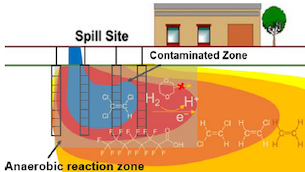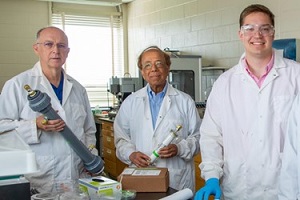Hot Off the Press
The Superfund Research Program (SRP) regularly highlights basic and applied research and activities from the program that span multiple disciplines.
Research Briefs
Combining Arsenic Data Across Populations Sheds Light on Exposure Sources

By combining data across three different populations, SRP researchers were able to better characterize sources of arsenic exposure that should be included in risk assessments. Funded by an SRP data management supplement, the study was a collaboration among the University of California, Berkeley, University of New Mexico, and Columbia University SRP centers.
Improving How Microbes Break Down PFAS

NIEHS Superfund Research Program (SRP) grantees demonstrated a method to break down per- and polyfluoroalkyl substances (PFAS) into smaller, non-toxic molecules. Led by Yujie Men, Ph.D., of the University of California, Riverside, the team also showed that some types of PFAS can be more easily degraded than others.
Emerging PFAS Can Cause Changes in Gene Expression and Lipid Accumulation in Human Liver Cells
PFAS can induce significant increases in gene expression and lipid accumulation in human liver cells at lower concentrations compared to PFAS no longer in use, according to researchers funded by the NIEHS Superfund Research Program (SRP).
Environmental Factor Articles
Exposure to Antibacterial Chemical Via Lactation Linked to Liver Damage in Newborn Mice
Funded by SRP, a study by researchers at the University of California, San Diego found evidence that newborn mice can be exposed to the antibacterial chemical triclosan during lactation, resulting in significant fat build up in their liver - an early sign of nonalcoholic fatty liver disease (NAFLD).
Plant-Based Material Can Remediate PFAS, New Research Suggests
A novel technology that can efficiently bind to and break down PFAS in the environment was developed by scientists at Texas A&M Agrilife Research with support from an SRP individual research grant. The new approach uses a plant-based material that adsorbs PFAS, and microbial fungi that literally eat up PFAS and could provide a powerful solution for finally getting rid of these contaminants.
Extramural Paper of the Month: Prioritizing Understudied Compounds in Chemical Mixtures Could Offer Insight into Breast Cancer Risk
Researchers funded by the University of North Carolina at Chapel Hill SRP Center identified understudied chemicals that frequently occur in the same products as those linked to breast cancer. These findings could inform studies looking at how exposure to chemical mixtures influences disease risk.
Superfund Research Program boosts innovation, outreach, and training
NIEHS Director Rick Woychik, Ph.D., spoke with Bill Suk, Ph.D., who directs the program, and SRP Health Scientist Administrator Heather Henry, Ph.D., to learn more about emerging research challenges the program is tackling. Examples include how to effectively clean up PFAS contamination, promote good nutrition to counter the effects of pollutants, and prevent toxic metals from impacting children's health, to name just a few.
Extramural Paper of the Month: Silicone wristbands highlight chemical exposures following Hurricane Harvey
An SRP-funded study was the first to reveal higher personal chemical exposures immediately following Hurricane Harvey compared with an estimated baseline. Hurricane Harvey caused flood-related damage to chemical plants and oil refineries, and flooded hazardous waste sites, including 13 Superfund sites.
Toxic agents can target mitochondria, influence disease, expert says
Duke University SRP Center researcher Joel Meyer, Ph.D., discussed his research into how early-life mitochondrial toxicity can affect later-life health, during NIEHS Keystone lecture.
North Carolina Fish Forum Turns Research Collaboration into Action
Researchers across three SRP-funded universities and their stakeholders organized the North Carolina Fish Forum in 2019. Three years later, the collaborators continue to reveal new insight into contaminants in fish, inform more health-protective advisories, and communicate risks to the public.

Antiviral Membranes Boost Masks' Ability to Stop COVID
Researchers at the University of Kentucky SRP Center created new membranes that can deactivate SARS-CoV-2 on contact, preventing the spread of COVID-19. The membranes combine nanotechnology with antiviral substances, creating a material that can capture coronavirus-sized particles and effectively neutralize.
PFAS Conference Supported by NIEHS Engages Key Stakeholders
PFAS were front and center during the 3rd National PFAS Meeting in Wilmington, North Carolina. Funded in part by SRP, the conference brought together scientists, community members, and policymakers who shared research and, in some cases, emotional stories about the chemicals.
Extramural Paper of the Month: Prenatal Exposure to Chemical Mixtures Worsens Working Memory in Adolescents
Prenatal exposure to chemical mixtures worsens working memory in adolescents, according to research by the Harvard School of Public Health SRP Center. The researchers evaluated prenatal exposure to individual chemicals and their mixture in relation to working memory - the ability to keep information in one's mind and mentally manipulate it - among adolescents living near a Superfund site in New Bedford, Massachusetts.
to Top



